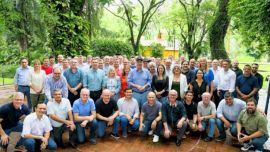A new ancestry archive is helping Argentines discover how their ancestors arrived in the country.
The Centre for Latin American Migration Studies (CEMLA) has created a database spanning 160 years – from 1800 to 1960 – through which users can find out the ship of arrival and professions of over four million immigrants.
CEMLA has now made the historical records of immigrant arrival in Argentina available online. With just minimal data, users can probe the information available on their ancestors and their vessels with just a click, discovering unknown details about their personal history.
Those wishing to search need the full name of the person being investigated, and the database (with information from 1800 to 1960) will reveal the ship on which their relatives sailed to Argentina, or the person’s line of work.
This database comprises over 4.4 million people in total, featuring information on 200 countries of origin, over 75 years of records up to 1960, and over 3,500 vessels where they travelled to settle in this country.
How the CEMLA search engine works
- Visit www.cemla.com/buscador/
- The search engine will then ask you for the full name of the person whose history you seek
- Complete the CAPTCHA test (the alphanumerical code appearing in the screen) and click on “buscar” (search) to pick up your information.
CEMLA has promoted and disseminated academic texts related to migration to and from Latin America since 1985, as well as activities conducive to a better understanding of the issues of migrants within society.
This institution has the first library specialising in migration in Argentina, with over 4,000 books and serial publications to date.
– TIMES/PERFIL




















Comments